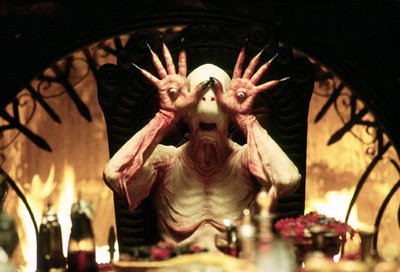Film: Pan's Labyrinth
 Ivana Baquero in Pan's Labyrinth, directed by Guillermo del Toro |
Capitán Vidal, with the smug approval of the Spanish Church (represented by a priest who comes to dinner at Vidal's house), is trying to root out the last remnants of the Republican opposition. His methods are ruthless, torture sessions and summary executions that del Toro shows in graphic detail (making this movie emphatically not for children or the squeamish). Ofelia understands that she and her mother are in Capitán Vidal's power, remaining safe mostly because he is obsessed with the son he believes Carmen is about to bear. When it becomes clear that the pregnancy is a grave threat to his new wife's health, Vidal orders her doctor to save the child at all costs, even Carmen's life. The only person who can help Ofelia is Vidal's housekeeper, Mercedes (a pretty and fastidious Maribel Verdú), a local woman taking many risks to help the Republican fugitives. She becomes a sort of fairy godmother.
 |
Del Toro has guided his actors through fine performances. Ivana Baquero, who was ten years old at the time the film was shot, is a vision of innocent beauty, but with the awareness of a girl on the brink of adulthood. Sergi López is an impervious paragon of cruelty as the Fascist officer, an unpredictable sadist capable of inflicting horrible pain, even on himself, and as tightly wired as the watch he obsessively tries to repair throughout the film. Fine supporting work comes from Álex Angulo as the good-hearted Dr. Ferreiro, who does the best he can to heal the wounds caused by his employer.
| Other Reviews: A. O. Scott | Ann Hornaday | Anthony Lane | Rotten Tomatoes | Le Monde |
The risk of relying so extensively on special effects is that the fantastic half of the plot may not join with the realistic to form a coherent story, a challenge del Toro has overcome. The murky world of the house and forests, shot with loamy darkness by Guillermo Navarro, del Toro's frequent collaborator as Director of Photography, is a place already between worlds, where one can easily imagine ancient horrors lurk. If anything, the viewer, like Ofelia, hopes for the appearance of the imagined world, as a way to escape a desperate reality. Del Toro once owned his own special effects company, and in Pan's Labyrinth the effects work because they are integrated into the story in as natural a way as possible.
 Guillermo del Toro and Doug Jones as the Faun, on the set of Pan's Labyrinth |
Pan's Labyrinth has been leaving film critics speechless ever since its wildly successful screening at last May's Cannes Film Festival. In the Post, Ann Hornaday wrote of the film with reverent praise, and the vast majority of all reviews are overwhelmingly positive (97% approval at Rotten Tomatoes). None of the movie's dazzling special effects would make any impression if the viewer were not interested in the character of Ofelia or did not believe in the fragility of her situation in life. We want Ofelia to escape because we like her, and ultimately we do not care if her fantasy is real or imagined. In a brilliant way, Del Toro leaves that and many other questions unresolved.
Now screening at E Street Cinema and other theaters in the Washington area.





















































No comments:
Post a Comment